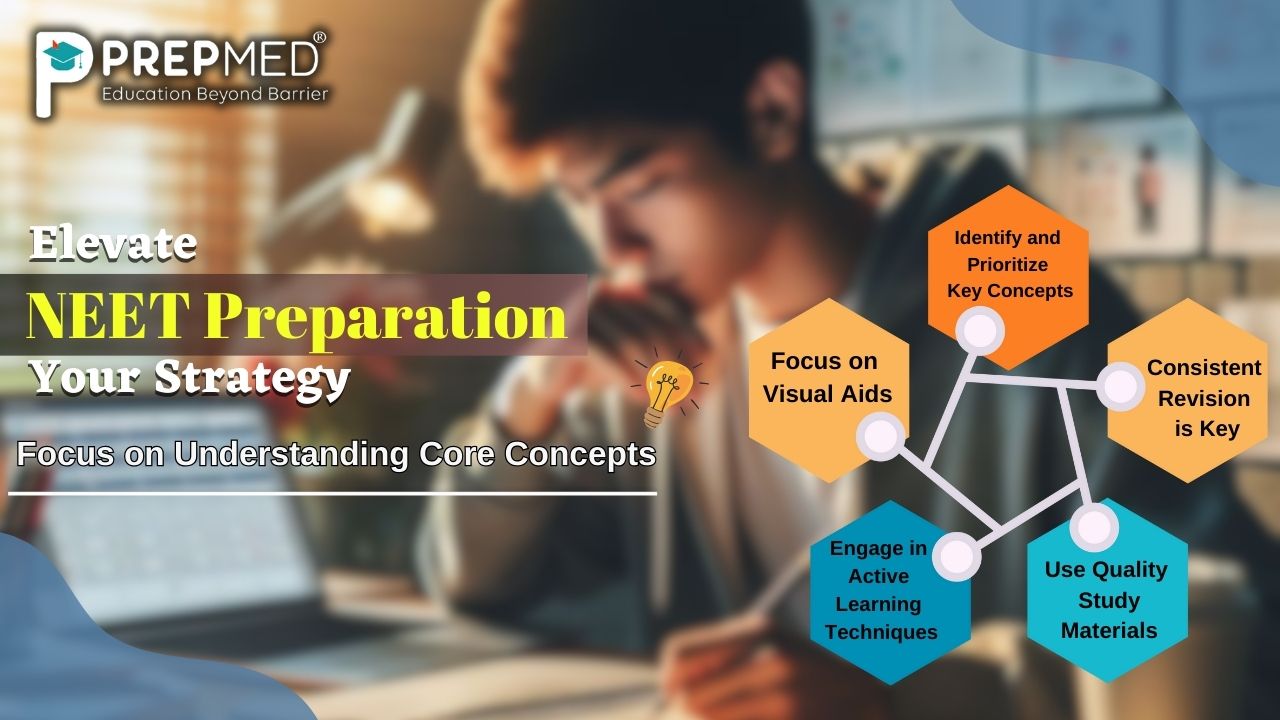September 28, 2024
Elevate Your NEET Preparation Strategy: Focus on Understanding Core Concepts
Every year so many students across all over India apply for the NEET exam. Therefore the competition here is quite high. However, the right NEET Preparation Strategy is the key. Now the question might arise: why is it hard to crack the NEET exam?
Many times it is observed that students may rely only on rote memorization techniques. Here is where the challenges start. Without understanding the core subjects properly, it is surely difficult to crack NEET. Moreover, only rote memorization will lead you to stay confused and stressed.
In this blog, we will discuss the essential ideas behind the subjects, ensuring a comprehensive and effective preparation.
Why Understanding Core Concepts Matters?
NEET exam comprises the core essential subjects i.e Physics, Chemistry and Biology. Now, if you only memorize these subjects, if you do not possess a thorough understanding. Here's why understanding core concepts is necessary-
- Problem-Solving Skills: Many NEET questions are designed to test your ability to apply concepts rather than just recall information.
- Long-Term Retention: When you understand the foundational principles, you are more likely to remember them in the long run.
- Interconnected Learning: The NEET exam often includes interdisciplinary questions, where knowledge from different subjects overlaps. A solid grasp of core concepts allows you to make these connections seamlessly.
Strategies for Building Core Concept Understanding
To manage your NEET preparation strategy, you can follow these following effective approaches-
1. Identify and Prioritize Key Concepts
The first thing that you can start with is breaking down the subject into their respective core components. Also you should focus on the fundamental topics to ensure that you have covered the essential part of the critical areas of the subjects. For instance-
- Physics: Concentrate on laws of motion, energy concepts, and basic principles of thermodynamics.
- Chemistry: Prioritize understanding atomic structure, periodic trends, and chemical bonding.
- Biology: Emphasize cell biology, genetics, and essential physiological processes.
2. Focus on Visual Aids
Visual aids are always helpful for students to remember things properly. Moreover it helps to break down the complex subjects into a simpler form.
- Diagrams: Create or find diagrams to illustrate processes, such as the cycle of cellular respiration or the structure of a neuron.
- Flowcharts: Develop flowcharts to outline processes in chemistry or biology, such as metabolic pathways.
3. Engage in Active Learning Techniques
For a deeper understanding, you can opt for active learning techniques. Here's how-
- Teach Back: Once you have finished studying a particular chapter now you can check if you have learned it correctly. Hence you can explain it to someone else considering yourself as a teacher. This will help you to understand where your knowledge gap is lying.
- Practice Problems: Often we feel scared of problematic topics and we tend to ignore them or procrastinate the chapters. For such situations, it is always recommended to face these subjects or chapters first and to break the fear by thorough practicing.
4. Use Quality Study Materials
While your NEET preparation strategy, it is important to check the right resources online. Therefore, research well on this. PrepMed, is an online platform specifically designed for NEET aspirants providing various resources customized to help you master core concepts. Also, it includes video recordings and interactive sessions.
5. Consistent Revision is Key
Include revising techniques in your NEET preparation strategy strictly. This will help you to have a clear knowledge and stay in your mind. You can follow these -
- Flashcards: Create flashcards for quick recall of definitions, formulas, and diagrams.
- Summarization: After studying a chapter, summarize the main points to reinforce what you've learned.
Mock Tests and Practice Papers
Mock tests simulate exam conditions and help you assess your understanding. Regularly solving mock tests can:
- Highlight areas that require further review.
- Improve your time management skills.
- Increase your familiarity with the exam format.
Time Management: Balancing Study and Rest

NEET exam requires your body and mind wellness. Hence, you should not pressurize yourself to the point that you cannot succeed in the exam. All you have to do is take proper breaks, sleep on time, and also study on time. Here are few things that you can follow-
- Create a Study Timetable: You can outline your daily and weekly study plan. Also, plan in such a way that you get sufficient time for each subject.
- Set Achievable Goals: Do not set your target high and then fail. Instead it is always better to set achievable easy goals. You can also break your subjects or chapters according to your preference and study. It will help you to focus better.
- Incorporate Breaks: Refresh your mind whenever you are feeling overburnt with studies. You can go for a walk or sleep but do not study at a stretch.
Conclusion:
Stay dedicated, keep practicing, and you will be well on your way to excelling in the NEET examination. Start your journey today and take the first step toward your medical career! Utilize resources like PrepMed to enrich your learning experience, and don’t hesitate to reach out for help or clarification when needed.
PrepMed helps medical students to find a way to achieve their dream goals to become a successful doctor. Our personalized notes, expert faculty are always ready for you to clear your doubts 24/7 along with paper discussions and many more other facilities.
FAQs About NEET Preparation Strategy
1. Should I rely on coaching classes for NEET preparation?
Coaching classes can provide structured guidance and additional resources, but self-study is also effective. Choose a method that suits your learning style.
2. How often should I take mock tests during my preparation?
Aim to take a mock test every two weeks initially, increasing frequency as the exam approaches. This will help build your endurance and confidence.
3. How can I reduce stress during my NEET preparation?
Incorporate relaxation techniques such as meditation, exercise, and hobbies into your routine. Maintaining a healthy balance is crucial for effective studying.
4. Is it necessary to study every subject equally?
Focus on your strengths and weaknesses. Allocate more time to subjects or topics where you feel less confident, but ensure that you cover all areas adequately.






